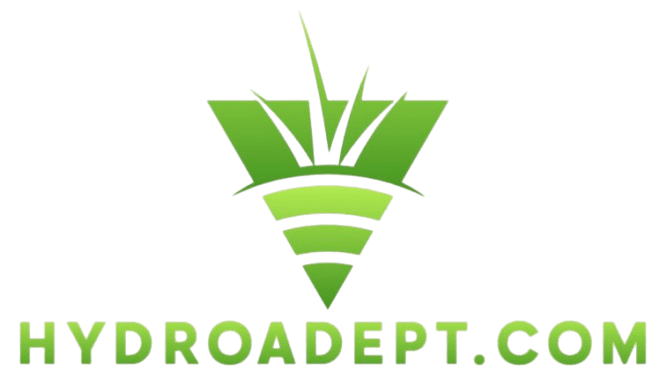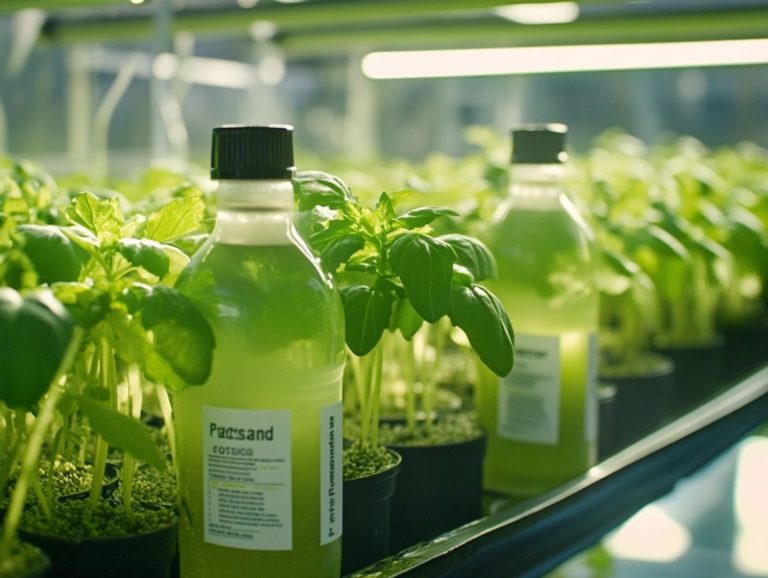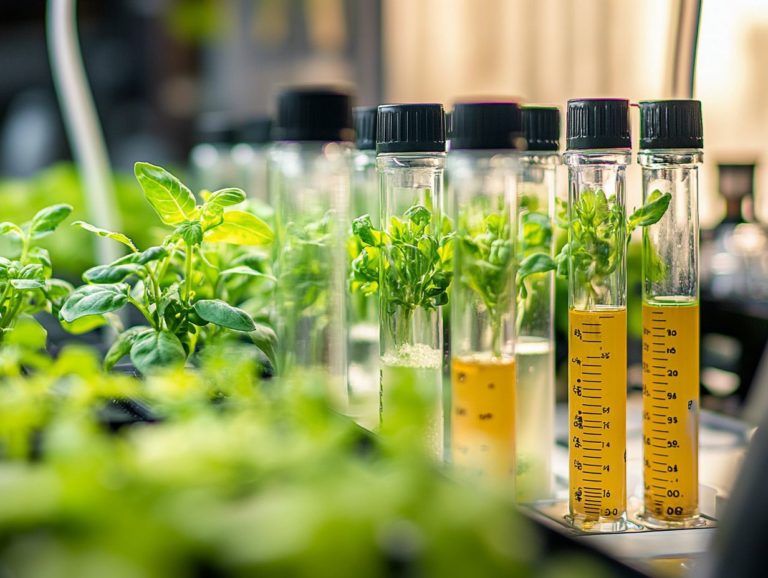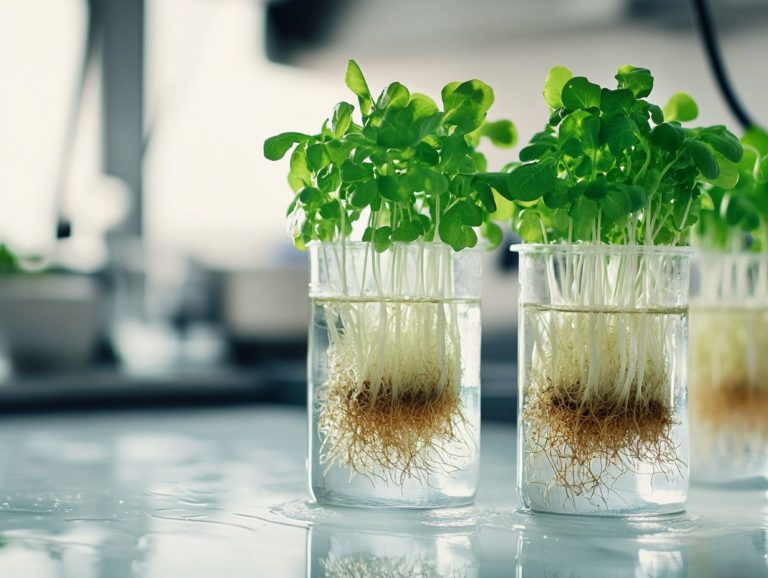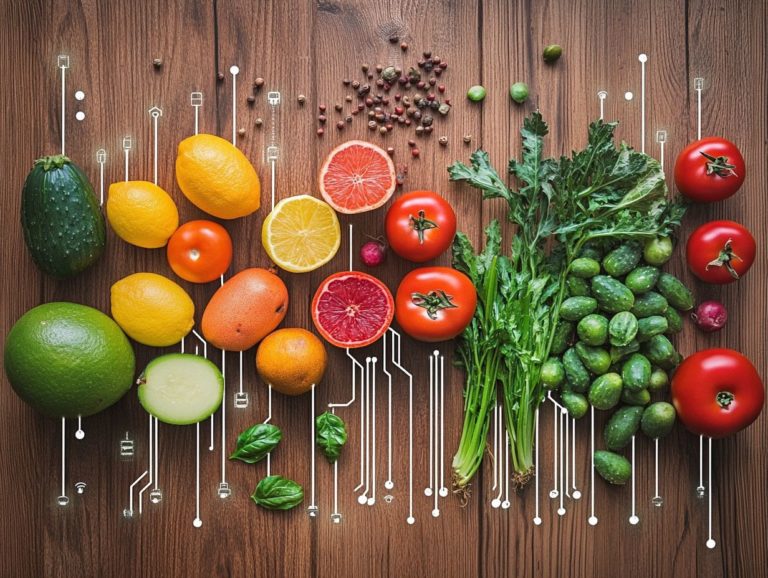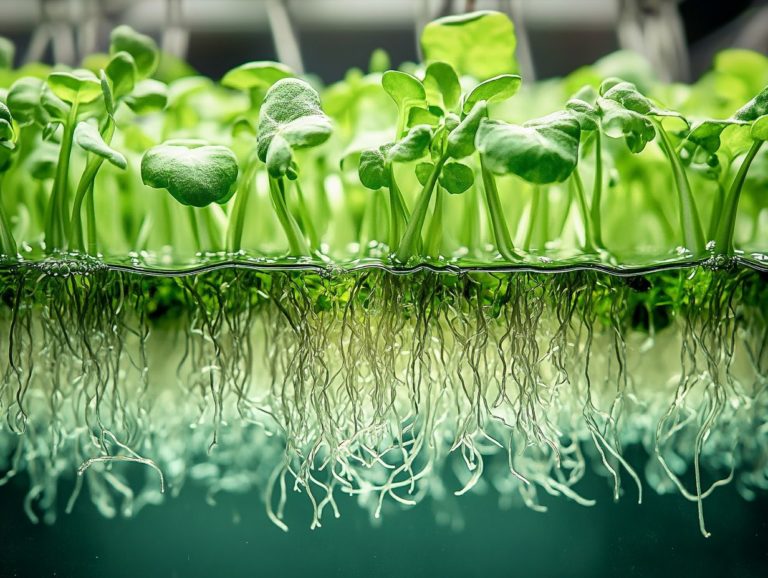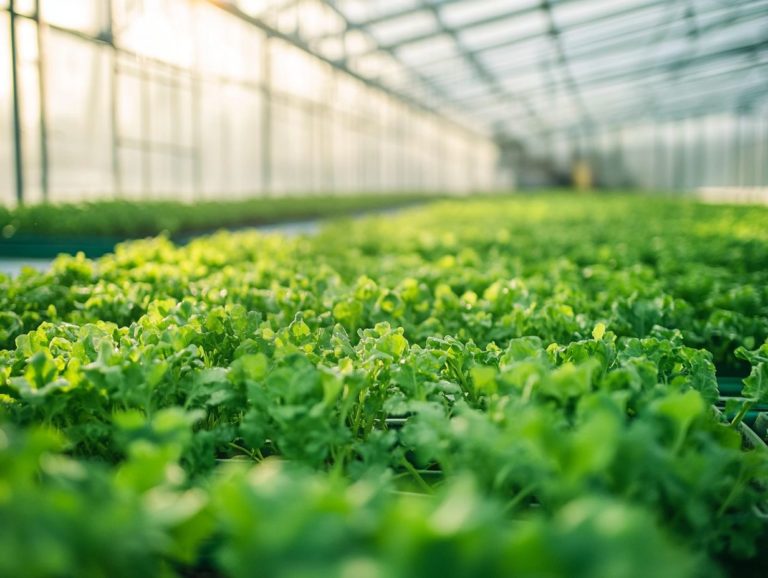Organic Nutrient Options for Hydroponic Systems
Hydroponic gardening is revolutionizing the way you grow plants. It presents a soil-free alternative that optimizes space and accelerates growth.
At the heart of this method lies the use of organic nutrients, which enhance plant health and resonate with eco-friendly practices.
This article explores the numerous benefits of organic nutrients, showcases common types available, and offers valuable insights on how to select and apply them effectively.
Whether you re a seasoned gardener or just starting your journey, understanding these concepts will empower you to cultivate flourishing plants sustainably.
Contents
- Key Takeaways:
- Benefits of Organic Nutrients for Hydroponic Systems
- Common Organic Nutrients for Hydroponic Systems
- How to Choose the Right Organic Nutrients
- Application and Maintenance of Organic Nutrients
- Organic Alternatives to Traditional Hydroponic Nutrients
- Frequently Asked Questions
- Do organic nutrient options cost more than synthetic options for hydroponic systems?
- What should I consider when choosing organic nutrient options for my hydroponic system?
Key Takeaways:
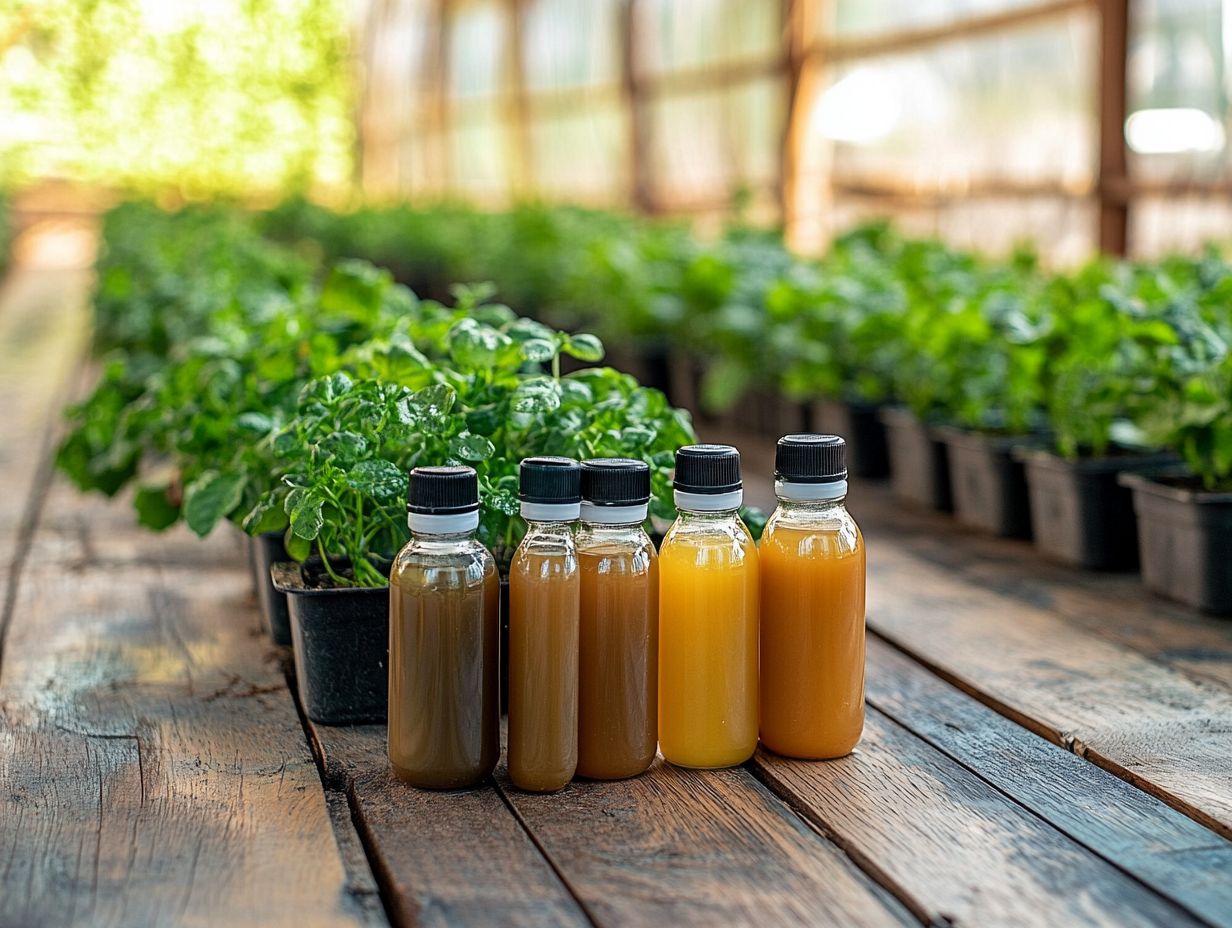
- Organic nutrients promote healthier plants and support eco-friendly practices in hydroponic systems, making them a top choice for many gardeners.
- When choosing organic nutrients, consider factors like nutrient balance, plant type, and growth stage for optimal growth and yield.
- Natural alternatives to traditional hydroponic nutrients, such as compost tea, worm castings, and seaweed extract, offer comparable benefits and can easily be incorporated into a hydroponic system.
Overview of Hydroponic Gardening
Hydroponic gardening is a groundbreaking method that allows you to grow plants without soil. Using water-based systems delivers essential nutrients directly to the roots, supercharging plant growth and crop yield.
This innovative approach aligns beautifully with sustainable agriculture practices that preserve biodiversity and minimize environmental impact.
As you and your community embrace hydroponics, you ll see how this efficient method transforms our understanding of farming, emphasizing water conservation and eco-friendly practices.
Various hydroponic systems are available, such as nutrient film techniques, aeroponics, and deep water culture. Each method supports plant life in unique ways.
These systems circulate nutrient-rich solutions, significantly reducing reliance on chemical fertilizers and pesticides, enhancing your organic farming endeavors.
By growing food in urban settings, you re not just cutting down on the carbon footprint linked to transportation; you re also enabling your local community to take charge of food production.
Ultimately, hydroponic gardening showcases how cutting-edge technologies pave the way for a more sustainable agricultural future. It fosters healthier ecosystems and promotes food security.
Benefits of Organic Nutrients for Hydroponic Systems
Incorporating organic nutrients into hydroponic systems offers a wealth of advantages. You can cultivate healthier plants while embracing sustainable practices that actively combat environmental degradation.
By opting for organic fertilizers sourced from materials like compost and fish emulsion, you enhance plant nutrition and boost crop yields while nurturing soil health and microbial activity.
Healthier Plants and Eco-Friendly Practices
Utilizing organic nutrients in your hydroponic systems fosters healthier produce. This significantly enhances plant resilience and reduces nutrient deficiencies that can hinder growth.
This eco-friendly approach supports organic farming methods and promotes biodiversity by creating a balanced ecosystem within the nutrient-rich hydroponic medium.
Integrating organic matter like compost and natural fertilizers cultivates robust crops that thrive in harmony with beneficial microorganisms, ultimately lowering your dependency on synthetic inputs.
These practices contribute not only to stronger, more vibrant plant health but also encourage a diverse array of life forms, essential for maintaining ecological balance.
Beyond the immediate benefits of nutrient-rich plants, this sustainable gardening approach aligns beautifully with broader environmental goals, such as reducing carbon footprints and conserving water resources. Your efforts can significantly impact the planet’s overall well-being.
Common Organic Nutrients for Hydroponic Systems
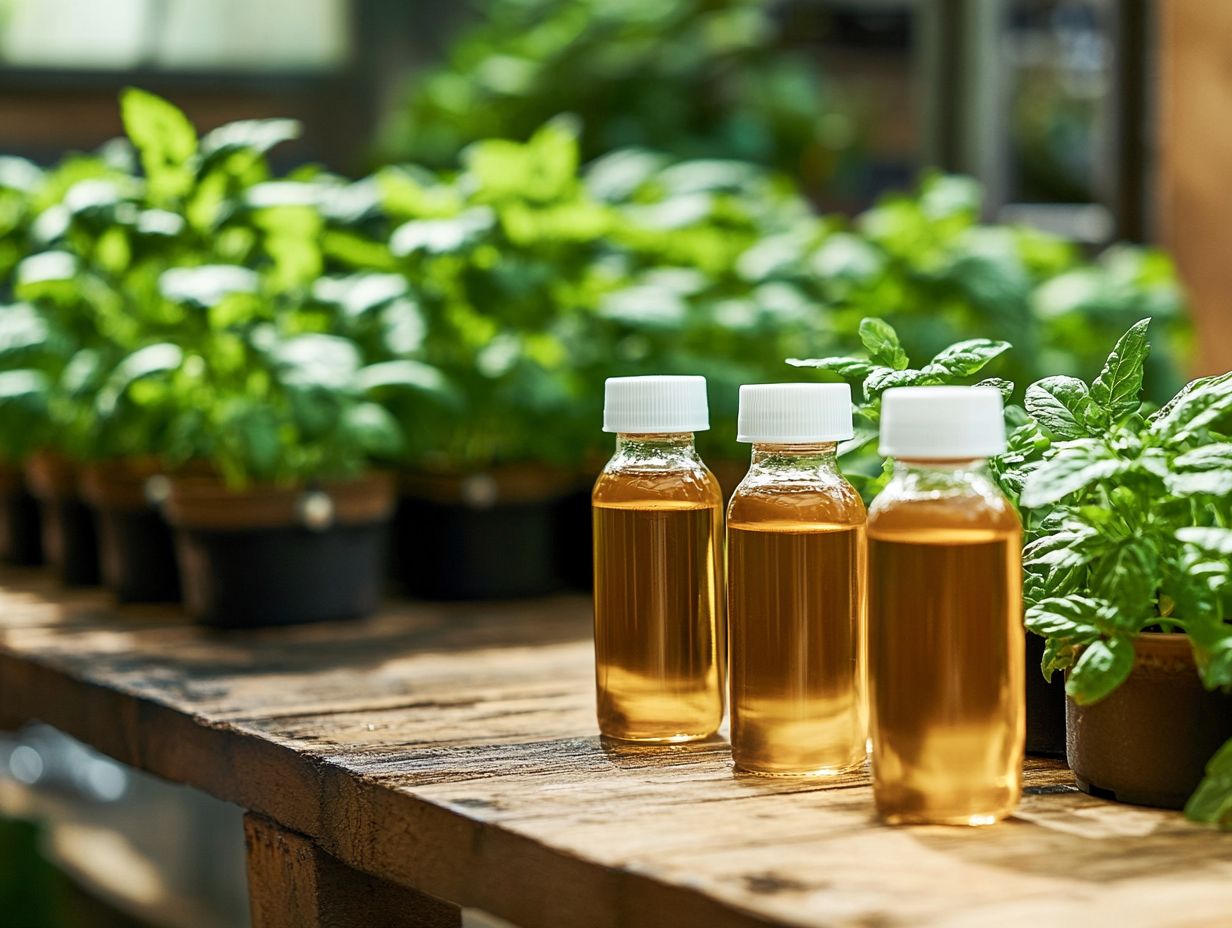
Common organic nutrients, such as nitrogen and calcium, are essential for hydroponic systems. They significantly boost plant growth and microbial activity. Understanding these nutrients helps you optimize your hydroponic setup for maximum yield and plant health.
Types of Nutrients and Their Functions
In hydroponic systems, it is crucial to grasp the different types of organic nutrients and their specific functions. Nutrients like nitrogen, phosphorus, and potassium each play vital roles in enhancing various aspects of plant health and productivity.
These essential nutrients are necessary for key processes such as photosynthesis, root development, and overall cellular functionality. For instance, nitrogen supports leaf growth and chlorophyll production, which directly influences a plant s ability to harness sunlight. Phosphorus is important for energy transfer and developing strong roots, enabling plants to access water and nutrients efficiently.
Potassium governs a range of plant functions, including water uptake and enzyme activation, which are essential for maintaining plant health. Organic sources, such as fish emulsion, seaweed extract, and compost, provide these vital nutrients while also enhancing soil structure and microbiological vitality. This creates an optimal environment for healthy plant growth.
How to Choose the Right Organic Nutrients
Selecting appropriate organic nutrients for hydroponic systems is essential for achieving optimal growth. Consider several key factors to ensure nutrient availability and maintain plant health.
Understanding these elements allows you to make informed choices that lead to healthier produce and elevated crop yields.
Factors to Consider for Optimal Growth
For optimal growth in your hydroponic systems, consider several key factors, such as nutrient absorption, environmental conditions, and the specific needs of the plants you’re cultivating. Tailoring your nutrient solutions to these elements creates an ideal environment that fosters plant health and productivity.
Light plays a crucial role in plant growth as it directly impacts photosynthesis and affects how efficiently your plants convert light into energy. Temperature is also important; fluctuations can affect metabolic rates and growth, potentially leading to stress if not managed properly.
Water quality is vital for nutrient uptake. Contaminants can hinder growth and absorption. When light, temperature, water, and nutrients work together, they ensure that your plants receive optimal nutrient levels, promoting vigorous growth and robust health.
By understanding the symbiotic relationship between these factors, you can fine-tune your hydroponic systems for maximum yield.
Application and Maintenance of Organic Nutrients
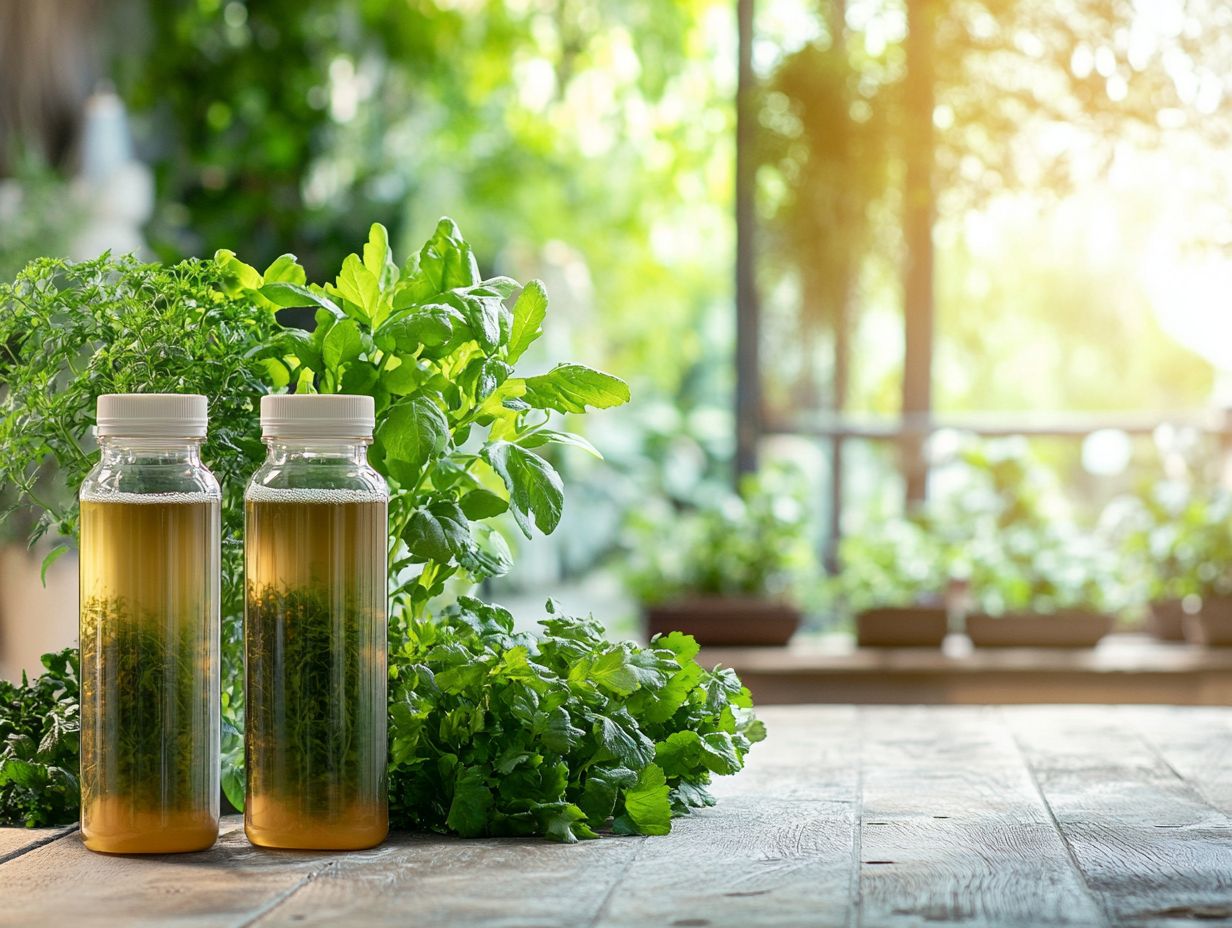
The application and maintenance of organic nutrients in hydroponic systems are crucial for ensuring optimal plant growth. Proper usage techniques enhance nutrient absorption and safeguard the health of your hydroponic system.
This attention to detail can significantly improve your gardening experience, yielding robust plants and a thriving ecosystem.
Start optimizing your hydroponic system today for healthier plants!
Proper Usage and Storage Techniques
Understanding the proper usage and storage techniques for organic nutrients is crucial for ensuring their effectiveness and longevity in hydroponic systems. By adhering to best practices in managing nutrients, you can maintain the quality of nutrient solutions and foster optimal plant growth.
To achieve this, store your organic nutrients in cool, dark spaces, away from direct sunlight to prevent degradation. Using airtight containers significantly minimizes the risk of contamination from moisture and air, preserving the nutrients’ integrity.
Regularly check nutrient concentrations and ensure they are mixed correctly before application to optimize nutrient delivery. Incorporate pH stabilizers to maintain an ideal environment for nutrient absorption.
By implementing these strategies, you can ensure that your hydroponic systems remain productive and efficient, leading to vibrant plants and fruitful harvests.
Organic Alternatives to Traditional Hydroponic Nutrients
Exploring organic alternatives to traditional hydroponic nutrients opens the door to more sustainable practices that meet the rigorous standards of organic certification.
These alternatives not only reduce your environmental footprint and support sustainable agriculture but also enhance the overall health and quality of your hydroponic crops, fostering a thriving ecosystem that benefits both you and the planet. For more insights, consider using nutrient solutions in different growing systems.
Comparison and Benefits of Natural Options
A comparison of natural options in hydroponics versus traditional hydroponic nutrients and organic fertilizers highlights the numerous advantages of selecting organic alternatives for enhancing plant growth and health. By understanding these distinctions, you can make informed choices that support sustainable practices and healthy gardening.
Natural options promote robust plant growth and biodiversity while enhancing nutrient availability through a balanced composition of minerals such as nitrogen and calcium and trace elements essential for plant nutrition. For those interested in optimizing their hydroponic systems, Understanding Hydroponic Nutrient Solutions can be invaluable. These organic alternatives boost microbial activity within the growing medium, leading to improved nutrient uptake and overall plant vitality.
Embracing eco-friendly solutions that promote water conservation significantly reduces the environmental footprint of hydroponics. This cuts down reliance on synthetic chemicals, which often disrupt surrounding ecosystems. By adopting these practices and using the best nutrient brands for hydroponic gardens, you cultivate healthier plants and contribute to a sustainable future through organic farming, where agriculture and nature coexist harmoniously.
Frequently Asked Questions
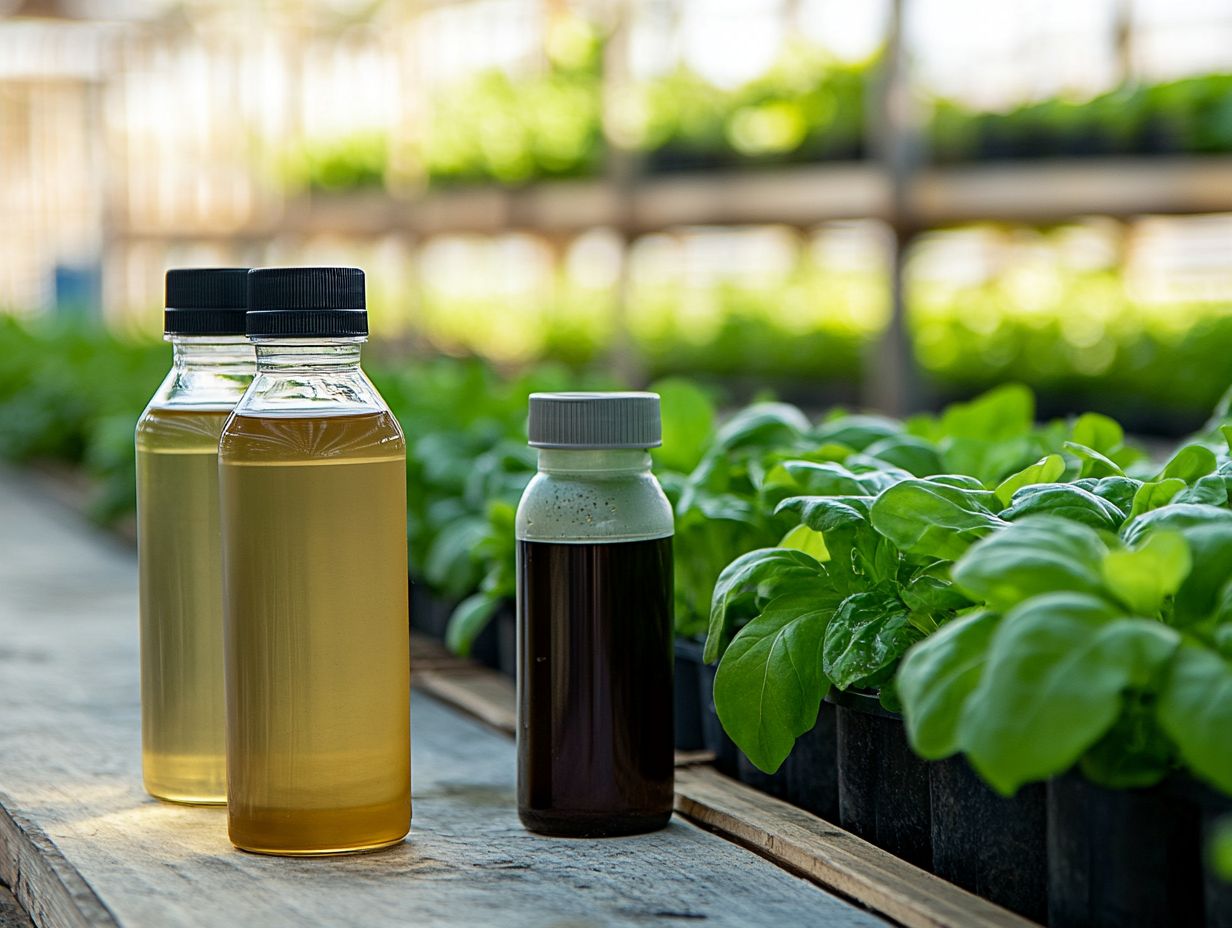
Discover Organic Nutrient Options for Your Hydroponic System!
Organic nutrient options for hydroponic systems include compost tea, seaweed extract, fish emulsion, and organic hydroponic nutrient blends.
Are Organic Nutrients Better for Hydroponic Systems?
Organic nutrients can be beneficial as they provide natural sources of essential minerals and can improve plant growth and health.
Can I Make My Own Organic Nutrient Solution?
Yes, you can create your own organic nutrient solution using compost, organic fertilizers, and other natural ingredients. Ensure proper nutrient balance and avoid any potential contamination.
Do Organic Nutrients Work as Well as Synthetic Nutrients?
Organic nutrients can work just as well as synthetic nutrients in hydroponic systems, provided they are properly formulated to meet all the necessary nutrient requirements for plant growth. Additionally, many organic nutrients offer benefits like improved soil health and increased resistance to pests and diseases.
Do organic nutrient options cost more than synthetic options for hydroponic systems?
Organic nutrient options may cost slightly more than synthetic ones. The long-term benefits of organic nutrients can be significant. These include improved plant health and reduced environmental impact.
What should I consider when choosing organic nutrient options for my hydroponic system?
When selecting organic nutrients, think about your plants’ specific needs. Focus on the nutrients the product offers, making sure it is certified organic.
Also, research recommended application rates for the best results. Unlock the full potential of your plants with organic nutrients!
